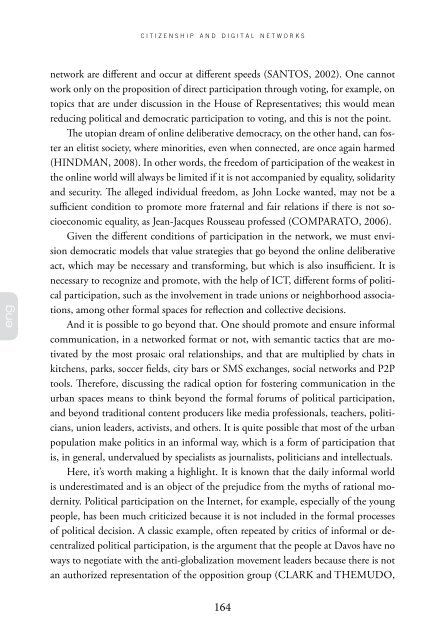Sergio Amadeu da Silveira - Cidadania e Redes Digitais
Sergio Amadeu da Silveira - Cidadania e Redes Digitais
Sergio Amadeu da Silveira - Cidadania e Redes Digitais
You also want an ePaper? Increase the reach of your titles
YUMPU automatically turns print PDFs into web optimized ePapers that Google loves.
eng<br />
c i t i z e n s h i p a n d d i g i t a l n e t w o r k s<br />
network are different and occur at different speeds (SANTOS, 2002). One cannot<br />
work only on the proposition of direct participation through voting, for example, on<br />
topics that are under discussion in the House of Representatives; this would mean<br />
reducing political and democratic participation to voting, and this is not the point.<br />
The utopian dream of online deliberative democracy, on the other hand, can foster<br />
an elitist society, where minorities, even when connected, are once again harmed<br />
(HINDMAN, 2008). In other words, the freedom of participation of the weakest in<br />
the online world will always be limited if it is not accompanied by equality, soli<strong>da</strong>rity<br />
and security. The alleged individual freedom, as John Locke wanted, may not be a<br />
sufficient condition to promote more fraternal and fair relations if there is not socioeconomic<br />
equality, as Jean-Jacques Rousseau professed (COMPARATO, 2006).<br />
Given the different conditions of participation in the network, we must envision<br />
democratic models that value strategies that go beyond the online deliberative<br />
act, which may be necessary and transforming, but which is also insufficient. It is<br />
necessary to recognize and promote, with the help of ICT, different forms of political<br />
participation, such as the involvement in trade unions or neighborhood associations,<br />
among other formal spaces for reflection and collective decisions.<br />
And it is possible to go beyond that. One should promote and ensure informal<br />
communication, in a networked format or not, with semantic tactics that are motivated<br />
by the most prosaic oral relationships, and that are multiplied by chats in<br />
kitchens, parks, soccer fields, city bars or SMS exchanges, social networks and P2P<br />
tools. Therefore, discussing the radical option for fostering communication in the<br />
urban spaces means to think beyond the formal forums of political participation,<br />
and beyond traditional content producers like media professionals, teachers, politicians,<br />
union leaders, activists, and others. It is quite possible that most of the urban<br />
population make politics in an informal way, which is a form of participation that<br />
is, in general, undervalued by specialists as journalists, politicians and intellectuals.<br />
Here, it’s worth making a highlight. It is known that the <strong>da</strong>ily informal world<br />
is underestimated and is an object of the prejudice from the myths of rational modernity.<br />
Political participation on the Internet, for example, especially of the young<br />
people, has been much criticized because it is not included in the formal processes<br />
of political decision. A classic example, often repeated by critics of informal or decentralized<br />
political participation, is the argument that the people at Davos have no<br />
ways to negotiate with the anti-globalization movement leaders because there is not<br />
an authorized representation of the opposition group (CLARK and THEMUDO,<br />
164


